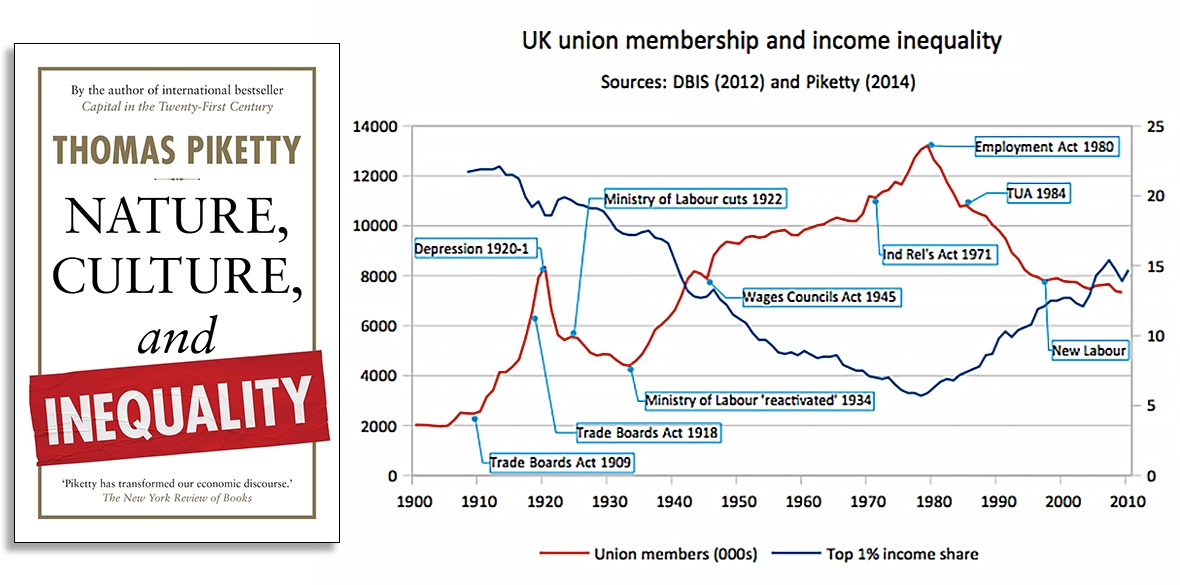This is the last article you can read this month
You can read more article this month
You can read more articles this month
Sorry your limit is up for this month
Reset on:
Please help support the Morning Star by subscribing here
Nature, Culture, and Inequality
Thomas Piketty, Scribe, £12.99
THOMAS PIKETTY is generally known for two mammoth contributions to political economy: Capital in the 21st Century, and Capital and Inequality. As such, his main focus of work has been on inequality, firstly in terms of how capital accumulates above growth and secondly explaining how ideology and policy contributes to inequality. Like an Enlightenment philosopher he works by empirical examination but with huge historical datasets detailing wealth, income and taxes.
Both of these previous books are involved and technical. His more recent work has been addressed to a lay audience and this barely 80-page work with one page of references is a case in point. Buried in the credits is a note that its based on a talk at the Societe d’Ethnologie in 2022. He has a number of key messages to transmit.
There is no natural state of inequality. If someone has more resources at their disposal it is not a result of their natural talents. Many great talents have left no mark on history because they were consigned to manual drudgery. Talent realised in practice, as Marx noted, is often the product of a great deal of compound labour, not to mention fat inheritances.
Inequality of natural resources is also no determiner of disparities. There is oil in Norway and oil in Nigeria but with very different outcomes. Rather than resources determining inequality, the evidence suggests it is the institutions chosen by these societies which determine the different outcomes, themselves the product of social, cultural and political history.
Wars as engines for redistributive change are often after the fact or beside the point.
As an example, a short chapter is devoted to Sweden, which until the 1930s had a very inegalitarian system. Only the 20 per cent richest men could vote, and the richer you were the more votes you could cast. Even corporations could vote in local elections.
However, for various reasons Sweden had a highly literate population compared to the rest of Europe at the beginning of the 20th century. A tide of pressure from the trade unions and a young Social Democratic Party brought universal suffrage in 1920 and political victory for the SDP from 1932 until the 1990s, which then reformed Sweden into a far more egalitarian society. Educate, agitate, organise is the lesson here.
Progressive taxation is a key tool. He has previously suggested that an aggressive inheritance and wealth tax could redistribute capital resources to all young adults. This idea dates back to Thomas Paine he notes elsewhere.
High taxation rates do not kill off capitalism. The US’s golden years of prosperity aligned with income tax rates as high as 80 per cent. Why is that? As he points out: “Income disparities of one to fifty or one to one hundred don’t do much good.”
Reaganomics, where the top tax rates were slashed, actually depressed economic growth, delivering the opposite of what it promised. David Harvey concurred with this in his work on neoliberalism.
Nature itself is under threat and Piketty produces figures which show the asymmetry on carbon emissions by nation and by wealth. The richest produce much more carbon than those on more modest incomes. Any strategy to properly tackle carbon emissions is going to have to deal with inequality.
Looking at the broad sweep of history, the author argues that the long-term trend is for greater equality, despite the setbacks of the last 45 years.
Piketty is one of a number of sensible economists who are getting some exposure by hammering out facts, as opposed to those who simply repeat incantations. Nothing he says here would contradict Gary Stevenson or Michael Hudson, and he holds out the hope that change can be swift.
Alas the necromancers of trickle-down economics and “there is no alternative” and their backers in the ruling class remain in power in the West. What is clearly required is education and organisation across a whole class. The engine of equality is “concerted social and political pressure.”












